Cheng Yang eight Zhai
Chengyang Bazhai is located in Sanjiang Dong Autonomous County, Liuzhou City, Guangxi, 19 kilometers away from Sanjiang County. There are eight natural villages in Chengyang Bazhai, commonly known as "Chengyang Bazhai". He is in charge of three administrative village committees and lives in nearly 10,000 Dong people. There are many festivals here, and he has the reputation of "the land of 100 festivals". When the Spring Festival comes, the villages boil, the village songs, and everywhere is full of joy.
Basic overview
In Sanjiang County, which borders Hunan and Guizhou, there are eight Dong villages in succession. They not only preserve the ancient traditions of the Dong people, such as wooden buildings, clothing ornaments, singing and dancing culture, and living customs, but also continue to develop and flourish in the blend of modern life and successfully develop into a new tourist village, which is Chengyang, Sanjiang Dong Autonomous County. Sail) Bazhai.
geographical position
Sanjiang County is located at the junction of Guizhou, Hunan and Guizhou. Chengyang Zhai is 20 kilometers north of Guyi Town. It is a large Dong family village with 8 natural villages, including Ma'an, Pingzhai, Yanzhai, Ping, Understanding Zhai, Chengyang Dazhai, Pingpu and Jichang. It covers an area of 12.55 square kilometers and has a total of 9701 residents of 2197 households. The world-renowned Chengyang Fengyu Bridge, a national key cultural relic protection unit, is located on the Linxi River beside the Bazhai Village in Chengyang. The Chengyang Bridge, which was built in 1912, is the world's current bridge.
Social customs and habits
1. "Stole a Bride for the Spring Festival"
Some of the Dong young men and women in Bazhai, Chengyang are introduced by both sides, some are self-knowledge, but the most magical and oldest way is still handed down to this day, that is, two or three nights before the Spring Festival when the young men "sing and sit at night".
After parents'approval, they will secretly marry the bride on the 30th night of New Year's Eve and return home to set off firecrackers in the middle of the night. Only then can people know which family has married the bride! What's more interesting is that some of them haven't seen the bride yet! That is to say, they do not know who the bride is! Thirty nights later, go and find out for yourself. If any girl wants to, she will marry the bride back home! uuuuuuuuuu
In the eight villages of Chengyang, Linxi Township, Sanjiang Dong Autonomous County, folk activities such as Yueye, Lusheng, trampling halls, lectures, and Doye were carried out, and the marriage customs of "stealing relatives" and "sending brides back" which were peculiar to the eight villages of Chengyang during the Spring Festival were most talked about.
After the couple registered for marriage, the custom here is that the groom can't take the bride home yet. On New Year's Eve, local grooms quietly marry in the middle of the night, and then set off firecrackers to celebrate, known as "stealing marriage". On the first day of the New Year, the bride went out to fetch water from her mother-in-law's house and appeared. She was officially a member of the groom's family and his village. On the second day of the New Year, the groom hosted a banquet for relatives and friends. In the new year's Eve, the bride and groom return to the door. The bridegroom invited all the relatives and friends to carry the pig, carry the chicken, pick sour fish and sour meat, and set off firecrackers along the way. In the long procession of sending relatives, the bride walks at the end with a piece of cloth in her hand so that outsiders can identify her. On the way to send relatives, in order to show the family business of the groom's family, the sending teams often make a deliberate detour to find crowded places to pass through. Every village along the way, firecrackers are set off. When the bride is sent to the bride's house, the bridesmaid is not allowed to enter the bride's house, but must return to the bridegroom's house immediately. The mother's family then served each guest a bowl of sugar-sweetened tea, known as "Happy Tea"...
2. Bride carrying water
There is a custom in Bazhai, Chengyang. On the first day of the bride's marriage to the groom's house, the first thing to do is to fetch water from the well beside the village. Generally selected by the sister and cousin of the bridegroom's family, there are also brothers and brothers of the bridegroom's family disguised as women's companions, which symbolizes that the bride will bear the burden of the family from now on, and will work together with her family and live in harmony.
3. Camellia oleifera
After breakfast on the first day of the first day, you will see the young men in the village go to see the bride at the bridegroom's house. If they know the bride or have been in love before, they will make a noise to ask the bride to bring them oil tea as the last farewell party.
4. Bridesmaids give clothes to brides
After breakfast on the first day of the first year, you will see the bride's girl, giving the bride a change of clothes. A load of neatly folded Dong clothes and cloth shoes loaded with bamboo baskets symbolizes the bride's ingenious weaving skills.
5. Drum Tower Doye
The old people in the Drum Tower of the village of Junior One gather together, hand in hand, shoulder to shoulder, and sing the Yale song. The contents are generally blessings, New Year, New Spring, new society, praise of the village, good life, commonly known as "Ye Tan Nian".
6. Group Wedding, Wine and Banquet
The bride marries the groom and celebrates the wedding wine the next day. The dinner can be divided into breakfast, lunch, dinner and breakfast for the third day of junior middle school. All the guests were relatives and friends of the bridegroom's family, and the bride had no share. On that day you will see the busy crowd of gift givers streaming and the sound of firecrackers.
VII. Baijia Banquet of Dong Nationality
"Baijiabanquet" is the highest etiquette for Dong people. Whenever villages exchange visits or special dignified visitors visit, the whole village households prepare their own wine, food and meals, together to Gulouping "I" type set up a long table, guests can eat from the first table to the last table, you and I come and go, cross-cutting, lively and extraordinary. It is said that there is a saying spread in the local area: "Eat a hundred family meals, couplet hundred family hearts, drive away all kinds of evil, hundreds of things".
"Baijiabanquet" is a cultural symbol of the Dong people's hospitality, solidarity, friendship and harmony. It has been circulated for hundreds of years in Sanjiang Dong area. With the passage of time, it has gradually evolved into a necessary reception ceremony for every major festival or visitor. In 2008, Sanjiang "Dong Baijiabanquet" was listed in the intangible cultural heritage protection project of Guangxi Autonomous Region, and in 2009 it became one of the third batch of national intangible cultural heritage projects declared by Guangxi.
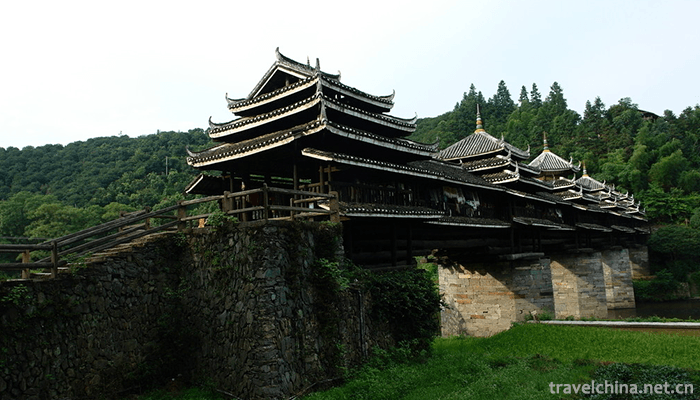
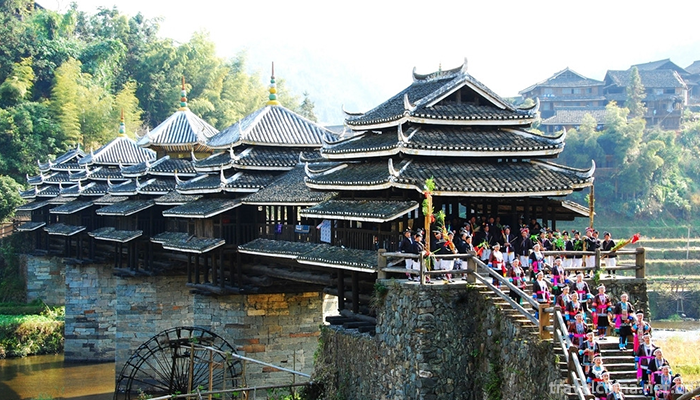
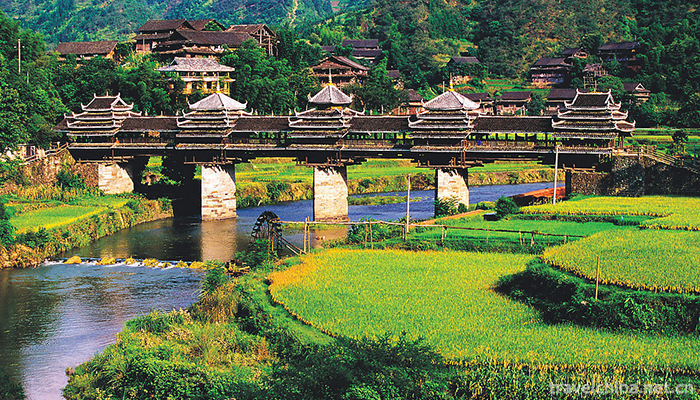
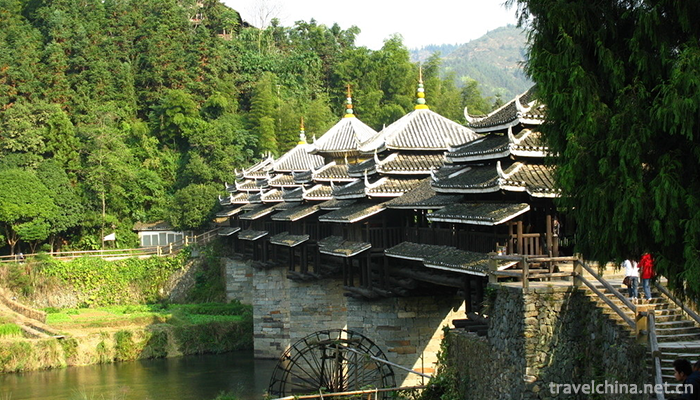
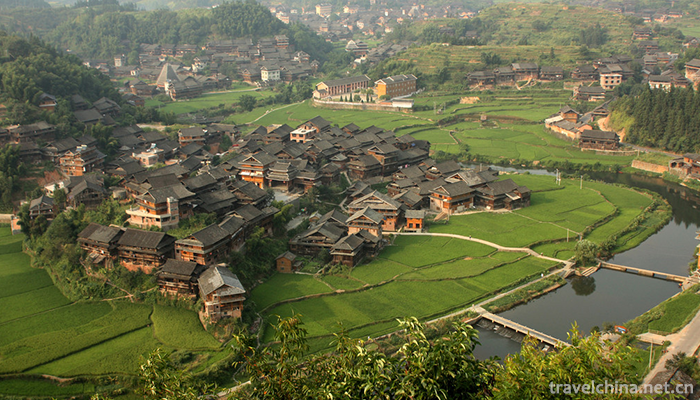
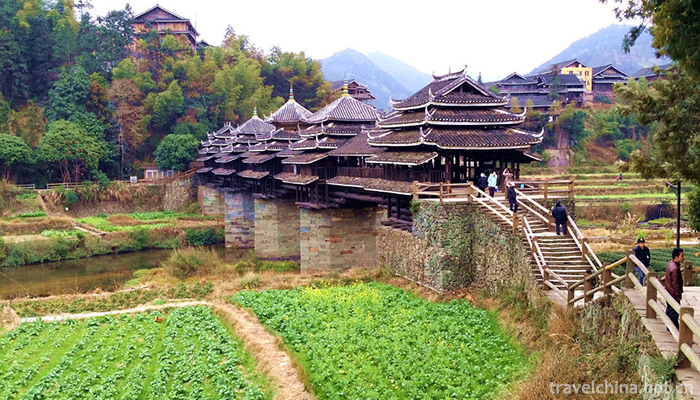
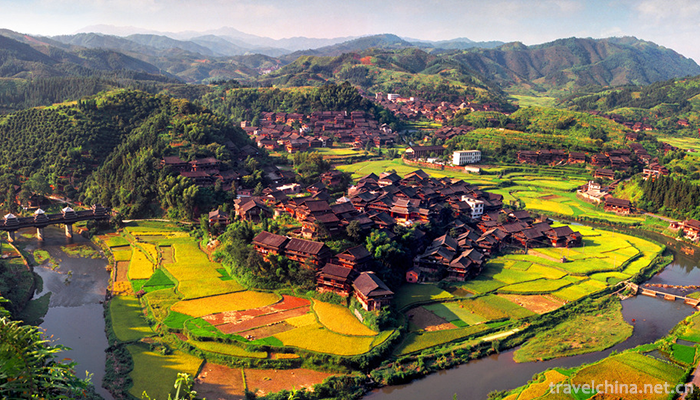
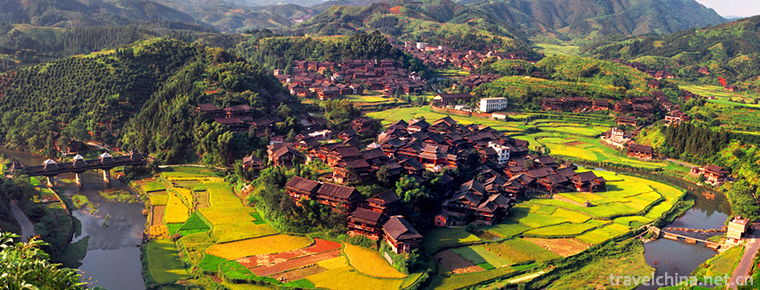
-
1.Nanshan Cultural Tourism Zone
Nanshan Cultural Tourist Area is located 40 kilometers southwest of Sanya City, Hainan Province. It is the southernmost mountain in China. It belongs to tropical marine monsoon climate.
Time 2018-12-12 -
2.Shanghai Urban Planning Exhibition Hall
The Shanghai Urban Planning Exhibition Hall was completed in early 2000 and opened to the public on February 25, 2000. As an important window for Shanghai's external publicity, Shanghai
Time 2018-12-19 -
3.wunv mountain city
Wunu Mountain City is a national key cultural relic protection unit. It was built by Zhu Meng, the ancestor of Koguryo. The three gates of the city are narrow at the bottom of the wall
Time 2018-12-22 -
4.Shandan Great Buddhist Temple
Shandan Grand Buddha Temple is located at the foot of the mountain 5 kilometers west of Shandan County, Zhangye City, Gansu Province. The old name of "Tufo Temple" was built in the Northern
Time 2019-02-08 -
5.Zhushan National Forest Park
Zhushan National Forest Park is located in Liuhua Po Street Office in the west of Qingdao Development Zone. It is a national forest park approved by the State Forestry Administration in December 2000
Time 2019-03-21 -
6.Fried Wudong with XO sauce
Ingredients: 2 packs of instant Wudong, 4 or 2 pieces of pork shreds (about 160g), 1/2 cups of onion shredded, celery shredded and carrot shredded, 1 egg, 4 tablespoons of XO sauce, 1 tablespoon of ra
Time 2019-03-23 -
7.Tibetan folk songs
Tibetan folk song is a magnificent flower in Tibetan folk literature, with profound ideological and high artistic quality. Throughout the development process of Tibetan folk songs
Time 2019-04-15 -
8.Traveling Books in Ningbo
Ningbo Walking Book, originally known as "Lotus Document" or "Plough Document", is one of the traditional local operas in Ningbo, Zhejiang Province. Sing in Ningbo dialect. Ningbo
Time 2019-06-08 -
9.Add another festival beside the word ants of the Zhuang nationality
The Zhuangs Ant Festival (insect word plus another) is mainly prevalent in the Hongshui River Basin in the northwest of Guangxi Zhuang Autonomous Region. It is named "Ant (insect word plus anothe
Time 2019-08-16 -
10.Bruce Lee
Bruce Lee (November 27, 1940 -1973 July 20th) Lee Jun Fan Teacher Ye Wen Born in California, USA San Francisco The ancestral home of China Guangdong Province Foshan City Shunde District Junan Town The
Time 2019-09-04 -
11.Chuanxindian earthquake site
Compared with Beichuan earthquake site, Yingxiu earthquake site and Hanwang town earthquake site, chuanxindian earthquake site in Shifang has unique advantages. It can fully reflect the great spirit of earthquake relief and has great protection and construction value.
Time 2020-11-05 -
12.Suining City Construction
In 2019, Suining completed the investment of 4.991 billion yuan in municipal infrastructure construction. The green space rate of the built-up area is 34.46%, the green coverage rate of the built-up area is 39.6%, and the per capita green space area of the park is 12.42 square meters.
Time 2020-12-16